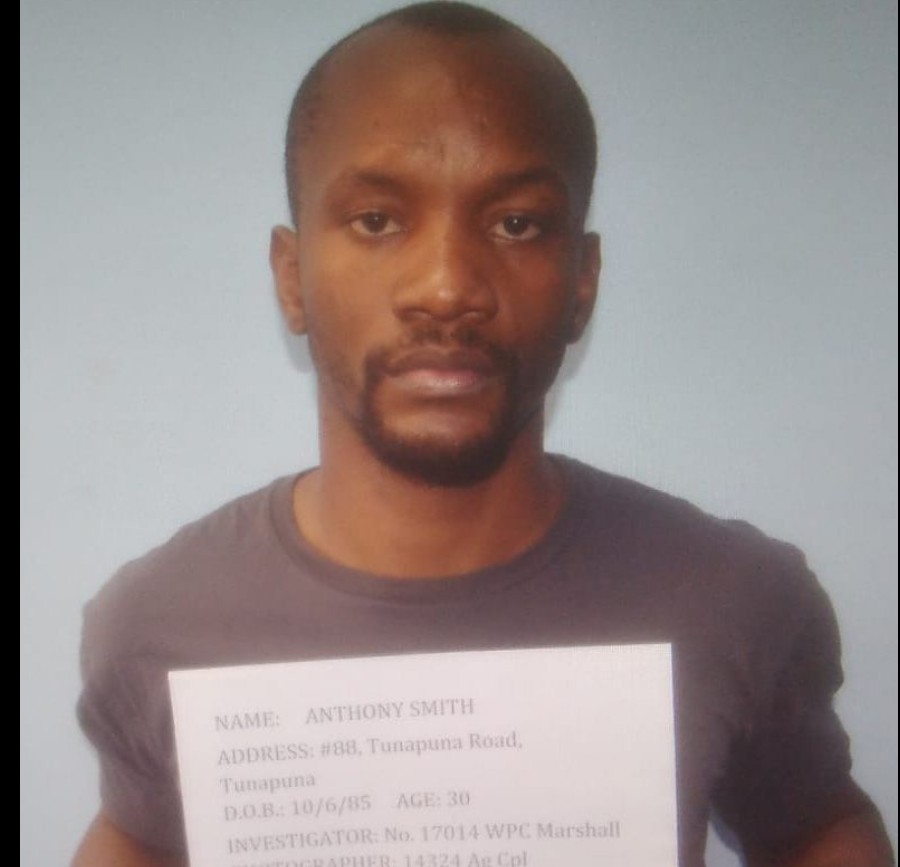(Trinidad Guardian) It was a bittersweet moment for the National Security Ministry and Trinidad and Tobago Police Service (TTPS) yesterday, as despite successfully achieving the first-ever conviction under this country’s human trafficking laws, the perpetrator broke free of his electronic monitor bracelet and is now on the run.
At a hastily called media conference yesterday, National Security Minister Fitzgerald Hinds started off with the good news that Anthony Michael Smith was on Thursday convicted of five counts of human trafficking under the Trafficking in Persons Act, which became law in 2012.
Smith, a local bar owner, was arrested in 2015 after he was accused of forcing a then 16-year-old Trinidadian girl to commit acts of prostitution, after she responded to a newspaper ad seeking employment. He was also charged with the sexual and physical assault of the victim.
Woman Police Corporal Dane-Marie Marshall, who was lauded by Hinds for her “exquisite” police work in the apprehension and subsequent conviction of Smith, explained how the arrest transpired.
“In September 2015, I was then attached to the Counter Trafficking Unit, and we received information from our counterparts in the TTPS, and we proceeded to a location in East Trinidad. Within the course of the investigation, I obtained a search warrant and searched a location in East Trinidad, where I found a Trinidad and Tobago passport belonging to a child. Investigations ensued as to why this passport was in a location where upon searching, we found several items of sexual paraphernalia and other things. And in the trafficking world, we tend to call these places, ‘places of ill repute’,” Marshall explained.
“The law provided that our children be safeguarded from places like these, so we proceeded to find this child with a view to ascertaining why the passport was at this location. It took some time and in November 2015, we found the child. We were able to interview the child and secure and record statements in relation to what occurred during the period she was in the custody of her trafficker.”
Two Venezuelan nationals were also found at the site but they chose to return to their home country.
Smith was arrested that same year. Marshall briefly described what was done to the child by Smith and others.
Sometime in 2015, she was asked to assist him with a foreign national at a hotel in Trinidad, and when he meant assist him, it was to have sexual intercourse with that person. The child found herself in various situations where she had to perform sexual intercourse with men and observed Mr Smith receiving money on her behalf. “During the child’s ordeal, she suffered beatings, embarrassment and sexual attacks from both Mr Smith and other clients,” Marshall said, pausing at times to collect her thoughts.
Minister Hinds had earlier referenced that the girl was of “low economic status” and “the child of a single parent household”.
“I say this because there are so many people of that experience who, perhaps for those reasons and more, can be vulnerable to the urges of people like Anthony Smith,” Hinds said.
But the timeline since his arrest in 2015 is crucial to understanding his escape.
“Smith was charged by myself in January 2016 and we went through a process of preliminary enquiry, which ended in June of 2017, when he was committed. In the process of a committal, we now wait for a date to be heard in the High Court and that date we got was September 18, 2023. So the trial commenced at that point. He appeared in the court not just one day but a few days up until the point that he made a decision to change his attorneys. Subsequent to the change of attorney, he did not appear, so he absconded while the trial had already commenced,” Marshall explained.
Minister Hinds sought to underscore that the law was designed so that the trial could continue ‘in camera’, even without his presence, and that led to his sentencing of 15 years in prison by Justice Geoffrey Henderson on Thursday.
Guardian Media understands that the last time the court saw Smith was on September 22. However, it was revealed at the media conference that for the last 880 days, Smith wore an electronic monitoring bracelet.
Head of the Electronic Monitoring Unit, Lawrence Hinds, was asked by Guardian Media to explain what happened.
“So, in 2021, Mr Anthony Smith, based on a condition of his bail was afforded electronic monitoring. He was then placed on 24-hour home curfew for 510 days. Following that, he approached the court for something called a variation of his order, that was to allow him to work and we changed the device, moving him from home curfew, and placed him on a one-piece device,” Lawrence Hinds revealed.
“Mr Smith stayed on that device for a further 370 days. On September 24, 2023, at approximately 6.32 am, his device sent an alarm to us, indicating there was some sort of interference. Following our standard operating procedures and all relevant checks, we initiated the police response mechanism after all attempts to contact him failed. That proved negative, as there were no signs of Mr Smith. The police continued their actions based on what they had to do and Mr Smith was no longer seen.”
Lawrence Hinds said this was the second time something like this had happened with the bracelets.
Minister Hinds subsequently told Guardian Media that steps have been taken to mitigate future recurrences.





